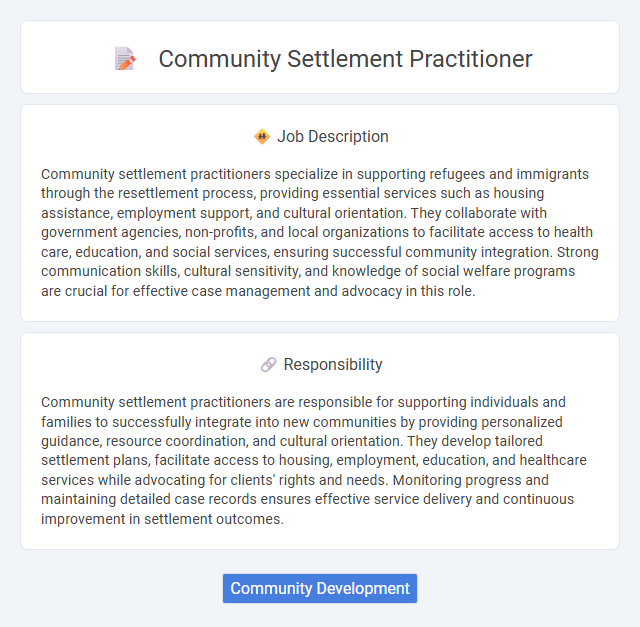
Community settlement practitioners specialize in supporting refugees and immigrants through the resettlement process, providing essential services such as housing assistance, employment support, and cultural orientation. They collaborate with government agencies, non-profits, and local organizations to facilitate access to health care, education, and social services, ensuring successful community integration. Strong communication skills, cultural sensitivity, and knowledge of social welfare programs are crucial for effective case management and advocacy in this role.
Individuals with strong interpersonal skills and a genuine desire to support diverse community members are likely suitable for a Community Settlement Practitioner role. Those who thrive in empathetic, problem-solving environments and can navigate complex social conditions may find this position aligns well with their abilities. However, candidates who struggle with emotional resilience or adaptability may find the demands of this job challenging.
Qualification
A Community Settlement Practitioner requires a qualification in community development, social work, or a related field, often complemented by relevant certifications in settlement services or intercultural competence. Proven experience working with diverse populations, along with strong communication and case management skills, is essential to support newcomers' integration effectively. Familiarity with local resources, government programs, and legal frameworks enhances service delivery and client advocacy.
Responsibility
Community settlement practitioners are responsible for supporting individuals and families to successfully integrate into new communities by providing personalized guidance, resource coordination, and cultural orientation. They develop tailored settlement plans, facilitate access to housing, employment, education, and healthcare services while advocating for clients' rights and needs. Monitoring progress and maintaining detailed case records ensures effective service delivery and continuous improvement in settlement outcomes.
Benefit
Community settlement practitioners likely provide significant benefits by facilitating smoother transitions for individuals and families moving into new communities, enhancing social integration and access to essential services. Their expertise probably supports improved mental health and well-being through tailored assistance and resource coordination. There is a strong probability that their work contributes to overall community cohesion and economic stability by helping newcomers establish networks and find employment.
Challenge
Community settlement practitioners likely face the challenge of balancing diverse client needs while navigating limited resources and complex social systems. They probably encounter difficulties in coordinating services across multiple agencies, which can impact the efficiency of support delivery. Managing cultural sensitivities and ensuring effective communication may also present ongoing obstacles in their roles.
Career Advancement
Community settlement practitioner roles offer extensive opportunities for career advancement through specialized training and gaining expertise in social policy, community development, and multicultural engagement. Progression often leads to senior practitioner, program coordinator, or managerial positions within nonprofit organizations, government agencies, or social services. Networking with industry professionals and acquiring certifications in community development significantly enhance promotion prospects and impact.
Key Terms
Community Development
Community settlement practitioners specialize in facilitating social integration and supporting vulnerable populations within diverse neighborhoods. They design and implement community development programs that foster local empowerment, improve access to essential services, and promote sustainable economic opportunities. By collaborating with government agencies, non-profits, and residents, they enhance social cohesion and drive inclusive growth.
 kuljobs.com
kuljobs.com